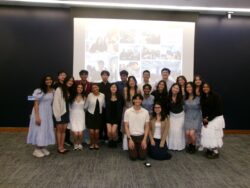Since the end of the last school year, a group of Georgetown students and faculty has been working to put together a Justice and Peace Studies major. Last week, the College’s Dean Chester Gillis endorsed the plan to create the major and approved the budget presented by the group. With this endorsement, the College will provide the funding necessary to staff the courses needed to offer the major.
The plan was first presented by Gianna Maita (COL ’15), who, after taking the Introduction to Justice and Peace Studies class, believed that a major in the field was something a significant number of Georgetown students would be interested in pursuing.
“Justice and Peace is a growing field, a lot of people are studying conflict resolution and international peace, so it’s really exciting that Georgetown could be one of the universities that takes that step to have this major,” said Maita.
Georgetown already offers students a Justice and Peace minor, and related majors such as Women’s and Gender Studies and a Social Justice concentration within the Sociology major. However, many students and faculty agree that a Justice and Peace Studies major would encompass broader issues that are excluded by the current curricular options.
“I was really surprised that Georgetown didn’t offer a Justice and Peace major, especially when so many people here are focused on areas like international relations and are concerned with the peace process and human rights,” said Jayme Amann (COL ’15), a student hoping to double-major in Government and Justice and Peace.
“For example, I think that LGBT issues in America are a human and civil right,” she said. “It’s an issue about justice. I don’t like to classify it as a gender issue because some people are gender ambiguous in the LGBT community. Having a JUPS major would be a better approach to the study of LGBT.”
The major is expected to fix this problem by increasing the number of courses offered in the field of Justice and Peace, as well as by recruiting more faculty.
“With the major we hope that there will be a stronger presence on campus regarding JUPS,” said Kyla McClure (COL ’15), another student involved in the plan. “Even when prospective students are looking at the school they can see that Georgetown is offering what is a pretty unique major.”
In a survey conducted by Maita and McClure in September 2012 to mostly students pursuing a Justice and Peace minor, 80 pecent of the participants said that they would consider a Justice and Peace Major. In addition, 79 percent of the respondents who were in the class of 2013 answered that they would have considered the major if it had been offered at the time of declaring their major.
As Professor of Justice and Peace Mark Lance explained in an email to the Voice, “The JUPS program has been one of the most popular minors for the last decade. There is a substantial interest in a major as well.”
There has also been a great emphasis on how a Justice and Peace major would contribute to promoting Georgetown’s Jesuit ideals.
“Social justice is the core focus of Jesuit education. Many students at Georgetown find ways to live out the central values the University subscribes to, but this is a major that will put those values at the center of the academic work,” wrote Lance.
Maita agrees. “We’re men and women for others,” she said. “We have a lot of students living that out in their extracurriculars. There’s lots of awesome organizations that do service and that look into social justice issues, but there isn’t one major that allows you to take the same lens of justice and peace and men and women for others.”
The next step in making the major official is convening a committee of faculty and students from the program to produce a proposal for a major. This proposal would include a detailed outline of the major requirements and courses.
“This will go first to the College Curriculum committee for feedback and, hopefully, approval. Eventually, new majors must be approved by the board of directors,” explained Lance.
Eli McCarthy, a professor of Justice and Peace studies, sees the major as a positive initiative for the University.
“This is a great opportunity to institutionalize a lot of amazing student social justice activism that has been happening at the campus for a variety of types of issues,” he said. “This gives an academic commitment to honoring that passion and skill and try to harness that and experiment more fully as a community.”
“We still have quite a lot of work ahead for drawing up the plan for a major and for getting it through all the other steps of approval,” said Maita. “However, by the time of my graduation, I will hopefully be doing so with a major of Justice and Peace.”





